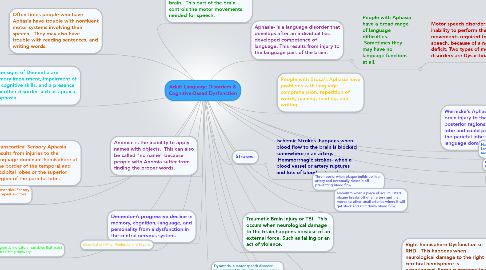Adult Language Disorders & Cognitive-Based Dysfunction
by Michaela Brown

1. Anomia- is the inability to apply names with objects. This can also be called "no name" because people with Anomia suffer from finding the proper words.
2. Often times people who have Aphasia have trouble with nonfluent motor systems involving their speech. They may also have trouble with reading sentences, and writing words.
3. Broca's Aphasia results from damage to the frontal lobe of the brain. This part of the brain controls the motor movements needed for speech.
4. Dementia-A progressive decline in memory, cognition, language, and personality from a dysfunction in the central nervous system.
5. Some signs of Dementia are memory impairment, impairment of the cognitive skills, and a presence of another disorder such as apraxia, or aphasia.
6. Transcortical Sensory Aphasia- results from injuries to the language-dominant hemisphere at the border of the temporal and occipital lobes or the superior region of the parietal lobe.
7. echolalia- Deals with Transcortical Sensory Aphasia they frequently repeat auditory stimuli.
8. Prognostic indicators- variables that assist in predicting recovery.
9. classified as : Mild, Moderate and Severe.
10. Aphasia- is a language disorder that develops after an individual has developed competence of language. This results from injury to the language part of the brain.
10.1. People with Aphasia have a broad range of language difficulties. Sometimes they may have no language functions at all.
10.1.1. Motor speech disorders are an inability to perform the motor movements required for effective speech, because of a neurological deficit. Two types of motor disorders are Dysarthria & Apraxia.
11. Strokes:
11.1. Ischemic Strokes- happens when blood flow to the brain is blocked somewhere in an artery. Hemmorrhagic strokes- when a blood vessel or artery ruptures and lots of blood enters the brain
12. People with Broca's Aphasia have problems with language comprehension, repetition of words, naming, reading, and writing.
13. Wernicke's Aphasia results from a brain injury to the superior and posterior regions of the temporal lobe and could possibly even effect the parietal lobe which is the language dominant area.
14. Right hemisphere Dysfunction or RHD. This happens when neurological damage to the right cerebral hemisphere is experienced. Some symptoms that are associated with RHD is, possible denial of the problem, difficulty recognizing faces, complete neglect of the left side of the body.
15. Traumatic Brain injury or TBI. This occurs when neurological damage to the brain happens because of an external force. Such as falling or an act of violence.
16. Jargon-use of real words put together without meaning.
17. logorrea- people may appear verbose or talk excessively
18. Naming, Repetition, Reading and writing, Language comprehension, fluency and motor output.
19. open head injury-occur when the skull and the meninges have been penetrated.
20. closed head injury- Result from motor vehicle accidents, falls, sports injuries, physical assault, or abuse.
21. Dysarthria- a motor speech disorder characterized by disruption in the range, speed, direction, timing, and strength of movements in the respiratory, phonatory, and articulatory.
22. Thrombosis- when plaque builds up in an artery and eventually closes it off preventing blood flow.
23. embolism-when a piece of accumulated plaque breaks off of an artery and then moves to other small arteries where it will get stuck and shut down blood flow.


